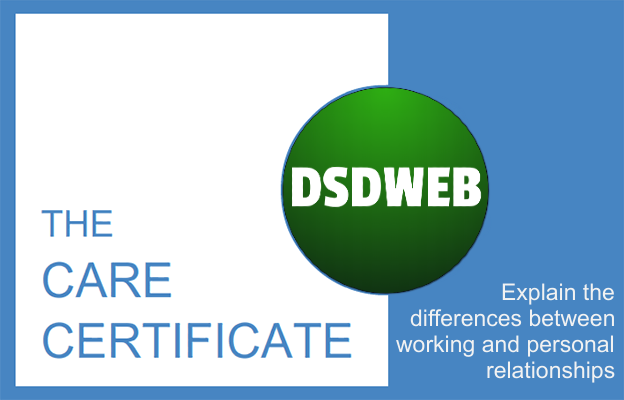This page is designed to answer the following questions:
- 1.3b Explain how a working relationship is different from a personal relationship (Care Certificate, Standard 1: Understand your role)
- 1.1 Explain how a working relationship is different from a personal relationship (Level 2 Diploma in Care, Responsibilities of a care worker)
- 1.1 Explain how a working relationship is different from a personal relationship (Level 3 Diploma in Adult Care, Responsibilities of a care worker)
NOTE: This page has been quality assured for 2023 as per our Quality Assurance policy.
On this page, we will explain how a working relationship is different from a personal relationship.
Positive relationships in the workplace are essential for providing good quality care, building mutual trust and respect and increasing job satisfaction. Personal relationships with our family and friends are also important for our overall well-being.
However, it is important to understand that there are several differences between working relationships and personal relationships.
On this page
Personal Relationships
Personal relationships are the unpaid, social relationships that you have with your family and friends. They usually have a social commitment or family bond. These are informal relationships, and you have the choice of whether you want to maintain them or not. Physical contact such as touching, hugging and kissing is appropriate in these types of relationships, as is the giving and receiving of gifts. Personal relationships can also include relationships with acquaintances, such as your neighbours or local shopkeeper.
Working relationships
Conversely, working relationships are the formal relationships that you have with the clients you support, their family, your managers and co-workers and outside agencies. They usually involve working as part of a team with a shared vision and a common goal. Unless you are a volunteer, you will be paid for your role. Physical contact will be limited, and records will be kept. Gifts should not be given or received. Very often, you will know more about the client (for the purpose of supporting them effectively) than they know about yourself. Service users will be more dependent on you than you are on them, which creates an unequal balance of power. This power imbalance should not be abused, and you should behave professionally at all times.
Table of differences between personal and working relationships
The main differences between working and personal relationships are shown in the table below.
Difference between working and personal relationships
| Working relationships | Personal relationships |
|---|---|
| Paid | Unpaid |
| Formal | Informal |
| Limited choice of whom you work with | Free choice of who you choose to be your friends |
| Cannot be intimate | Can be intimate |
| Bound by professionalism, policies and duty of care | Only personal boundaries |
| Limited by location e.g. office, care home etc. | Not limited to particular locations |
| Limited by time e.g. shifts, meetings etc. | Unlimited times that individuals may choose to associate |
| Purpose is to meet individual's care needs and no more | Purpose is to provide mutual pleasure |
| Unequal power balance - care worker will know more about an individual they support and the individual may have dependencies on the support worker. | Usually equal balance of power between individuals |
Blurring the lines
As we have seen, the key differences between personal and working relationships are where the relationship is established and the scope and limitations of the relationship.
But there may be times when the boundaries of a relationship are not so clear. For example, you may work for the same employer as another family member or develop a strong personal relationship with a colleague outside of the work environment.
In these cases, you should try to remain professional and maintain a working relationship whilst you are carrying out your job role. This will include ensuring that you do not treat those people for whom you have a closer personal bond more favourably than others. To try to avoid potential conflicts of interest with close friends and families working together, employers may choose to minimise the contact between such employees by ensuring that they are not on shift together or that they work in different locations/services. Your employer may have a policy relating to personal relationships at work.
Example question and answer
Explain the difference between working relationships and personal relationships
The relationships a health & social care employee has at work differ greatly from the personal relationships they may have outside of work. Working relationships are governed by professional boundaries, including:
- Legislation (e.g. the Data Protection Act 2018 prohibits the sharing of personal information that an employee may be privy to as part of their job)
- Employer’s policies and procedures
- Professional codes of conduct (e.g. the Code of Conduct for Healthcare Support Workers and Adult Social Care Workers in England)
Personal relationships are much less formal and more emotive and can involve intimate touching and expression that would be illegal in a health & social care setting. In addition, a person can choose who they associate with outside work, whereas they have much less choice whilst at work and may have to work with people they wouldn’t choose to associate with
It is important not to confuse working relationships with personal relationships as this could lead to an employee being biased, either positively or negatively, whilst making work-related decisions or carrying out their job responsibilities. It could also result in breaking the law.

